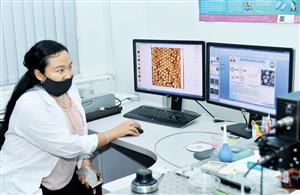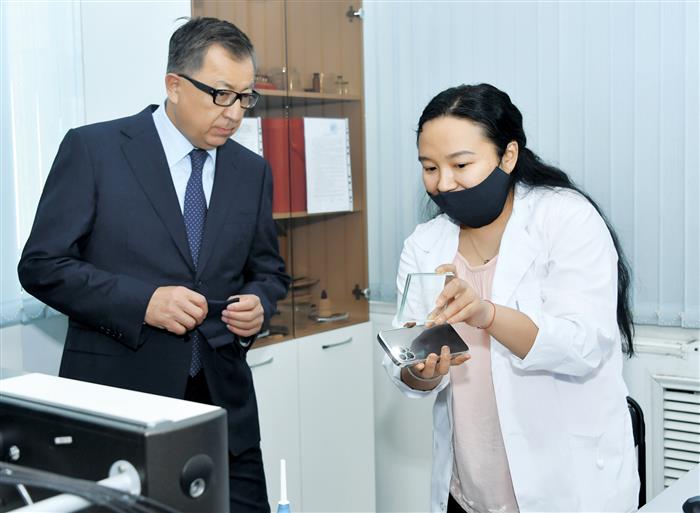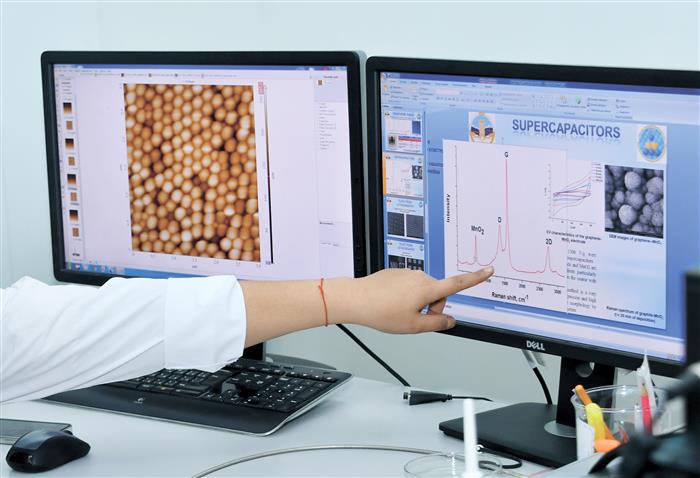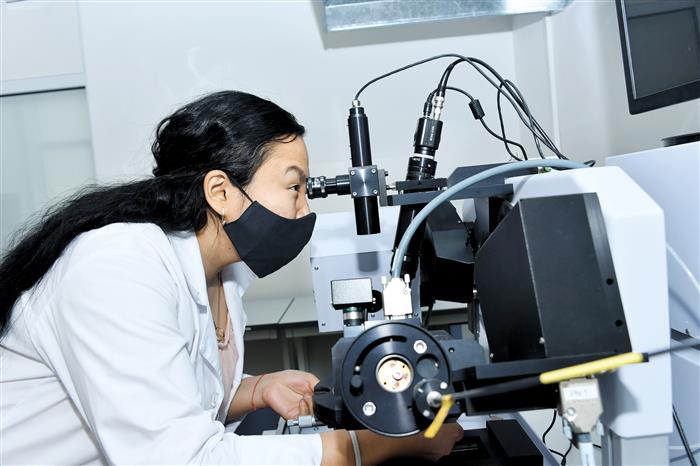- Main page
- News
Nanotechnology - the beginning of a new world
3/29/2022
Al-Farabi Kazakh National University is a classical multidisciplinary university that combines education, science, and innovation. Today the university is a leader in the number of scientific projects and scientific publications in our country. Every fifth Kazakhstani publication in the rated editions is prepared in KazNU. Five scientific journals are included in international databases. The total Hirsch index of our scientists is more than 3,100. The number of scientists and teachers with a non-zero Hirsch index is almost 1400. KazNU's achievements in the field of publication activity are marked by international awards.

Thus, the university received three nominations of the award "Leader of Science" of the authoritative database "Web of Science", confirming the leading position among Kazakhstani universities and research institutes. The University implements 500 scientific projects with a total budget of more than 7.7 billion tenge in priority areas of scientific and technological development. The scientists of the University have received more than 400 patents and copyright certificates. The university takes an active part not only in Kazakhstani, but also in major international projects. Scientists in physics develop joint international scientific projects with the world's largest laboratory of high-energy physics of the European Organization for Nuclear Research (CERN), the Institute of Nuclear Physics and the National Nuclear Centre. As part of these projects, teachers and students can take part in internships and carry out their experimental work at the best laboratories. Research projects on nanoparticles are carried out and, most importantly, there are tangible results.
There is a system of support for young scientists, and the "Best Young Scientist of KazNU" competition is held. Every year about 15 employees become winners of the state scientific scholarship for young talented scientists. The university develops student science and holds the annual "Farabi Alemi" conference. In 2021, a competition for the best student innovation projects was held as part of the conference. More than 60 innovative projects of students were presented, among which nine were selected. Their authors were awarded diplomas and cash prizes. In addition, 200 students at the university were awarded diplomas of the Ministry of Education and Science based on the results of the Republican Student Subject Olympiad.

Among today's youth, there are undoubtedly young scientists who make the greatest contribution to the development of nanotechnology. Now, young scientists under the age of 40 work at Al-Farabi Kazakh National University. Naturally, not without participation of scientific leaders, each teacher wants to see the result of their work, always with hope expect from their pupils of new discoveries in the field of science. Today we present to you a young scientist, Markizat Myrzabekova, who has justified the hope of her supervisor. Markizat is currently studying at the Faculty of Physics and Technology of Al-Farabi Kazakh National University, PhD in Material Science and Technology of New Materials.

Markizat is the eldest child in the family. Her younger sister followed in her footsteps and chose the natural sciences. "As a child she dreamt of becoming a doctor. At school I was very keen on mathematics. When you know mathematical equations well, physics and chemistry formulas are easy to follow. At school I often heard that physics was not for girls, that it was a field where mostly men worked. I was motivated by these words when choosing a profession. I entered the faculty of physics and engineering of Kazakh National University after Al-Farabi, but then I did not know that I will be engaged in a science. In the second year of the bachelor's degree in 2012 I got a part-time job at the National Laboratory of Open Type Nanotechnology (NLNOT). From then on, an interest in researching new materials, nanotechnology and discovering their new qualities became apparent. In 2014, she graduated from the Faculty of Physics and Technology at Kazna with a bachelor’s degree in Engineering and Technology. During my student years, I participated more than once in the student project "World of Farabi" and won prizes. My project on humidity sensors was recognised as the best student innovation," says Markizat.
A few years ago, Samsung recorded a mobile phone explosion, the battery detonating while charging. Markizat then had the idea of creating safe batteries for mobile phones. She took up the idea and the project were patented (certificate of authorship No 107731). She is now working to put her invention into production.
- Our phones are powered by lithium-ion batteries. And the mobile phone is not only explosive, but also due to the batteries being heavy. Developed countries use ruthenium oxide for lightweight batteries. However, there are very few ruthenium reserves in the world, so it is very expensive for manufacturers. In my project I propose to use manganese and graphene, reserves of which are plentiful in the world. The theme of my project is "creation of reliability-enhancing supercapacitors of graphene and manganese dioxide on the basis of domestic nanocomposites". Graphene (form of carbon), because of reaction with manganese dioxide appears electric current. Using this current we obtain a supercapacitor, i.e., an electrical storage device. In addition, the synthesis process is very simple and many times more efficient. The issue of energy saving is very topical nowadays. Mobile phones, electric cars, laptops, lightweight drones, they all need energy-saving components. Scientists are interested in reducing environmentally harmful technologies as much as possible. From that point of view, my batteries for mobile phones are very efficient to use - cheap price, light weight for long-term consumption, - says Markizat Myrzabekova about the benefits of her invention.
Markizat Myrzabekova received her master's degree in physics in 2016. Over the years, thanks to various programmes, Kaznu has travelled to Warsaw, Prague and Milan, where she did practical training in laboratories, and studied on an Erasmus+ grant in Dublin, Ireland. The field of nanotechnology in Europe, America and Japan is well developed. Therefore, our young scientists will only benefit from visiting such countries and seeing their innovative projects with their own eyes. NLNOT has helped with foreign trips. Markizat and from Kazakh National University repeatedly went abroad, participated in conferences, gained experience. And she successfully uses these skills in her scientific work.
Kairzhan TUREZHANOV

